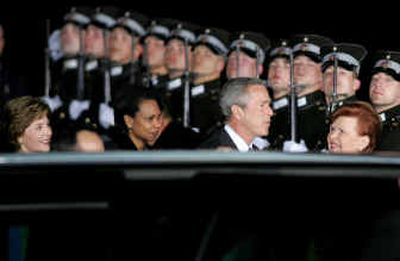Trip creates potential hot potato for Bush

RIGA, Latvia – American-Russian relations have rarely been simple, and President Bush’s latest visit to Moscow is no exception.
After all, it’s not every day Bush and Kim Jong Il are invited to the same party.
North Korea’s maximum leader is not expected to attend Russia’s 60th anniversary of the end of World War II in Europe, but the American president is, and so are a gaggle of former communist dictators.
Bush’s decision to accept Vladimir Putin’s invitation is creating the potential for political headaches involving new allies in Russia, and old anti-Russian allies elsewhere in Eastern Europe.
“It’s going to be an interesting dance here,” said Leon Aron, a Russian-born scholar at the American Enterprise Institute in Washington, D.C.
Also attending is the leader of Belarus, which Bush recently called “the last remaining dictatorship in Europe.” The president who wants to extend freedom to the world has also criticized democratic reversals in Russia itself.
Bush landed in Latvia late Friday, the beginning of a five-day trip planned around V-E Day events.
He told a group of foreign journalists this week that those attending the World War II event in Moscow “know how I feel about tyrants and dictatorship.”
“I’ve made my position very clear, and I view this as a celebration to end tyranny,” Bush added.
In the meantime, Bush will be spending his next four days dancing through Latvia, the Netherlands, Russia and Georgia, where he wraps up Tuesday.
The president wants to maintain good personal relations with Putin, though that won’t be so easy on this trip either – Putin and aides are upset that Bush is book-ending his trip with speeches in Latvia and Georgia, former Soviet properties that have little but disdain for Russia.
On the other hand, Bush also has to soothe the feelings of Latvia and other Baltic allies who, when they think about the Soviet victory in World War II, see the start of decades of communist repression.
In meeting the leaders of all three Baltic states – Latvia, Lithuania and Estonia – Bush will confront the hard feelings the Russian war ceremony has stirred up in the neighborhood.
The leaders of Lithuania and Estonia refused to attend Putin’s parade. Latvian President Vaira Vike-Freiberga is going, but said, “reconciliation is not an easy task – it may take a long time.”
Bush told the overseas journalists he is aware “the Baltics ended up with a form of government they weren’t happy with” after World War II, but everyone should focus on the modern rise of democracy. “It’s a moment to remind people that when the world works together, we can end tyranny,” he said. “And it will be an interesting observation to remind people tyrants still exist.”
Bush plans to discuss democracy and civil society during his beginning and ending speeches in Latvia and Georgia, comments that may well be interpreted as jabs at the Putin presidency in Russia.
“A visit to Latvia and a visit to Georgia is to say to Putin and the Russians, ‘These countries are now outside your sphere of influence and you had better get used to it,’ ” said Charles Kupchan, an international relations specialist at Georgetown University.
Bush and aides said the Latvian and Georgian trips are not aimed at Putin or Russia, where Bush arrives on Sunday.
The Red Square military parade to commemorate World War II is set for Monday.